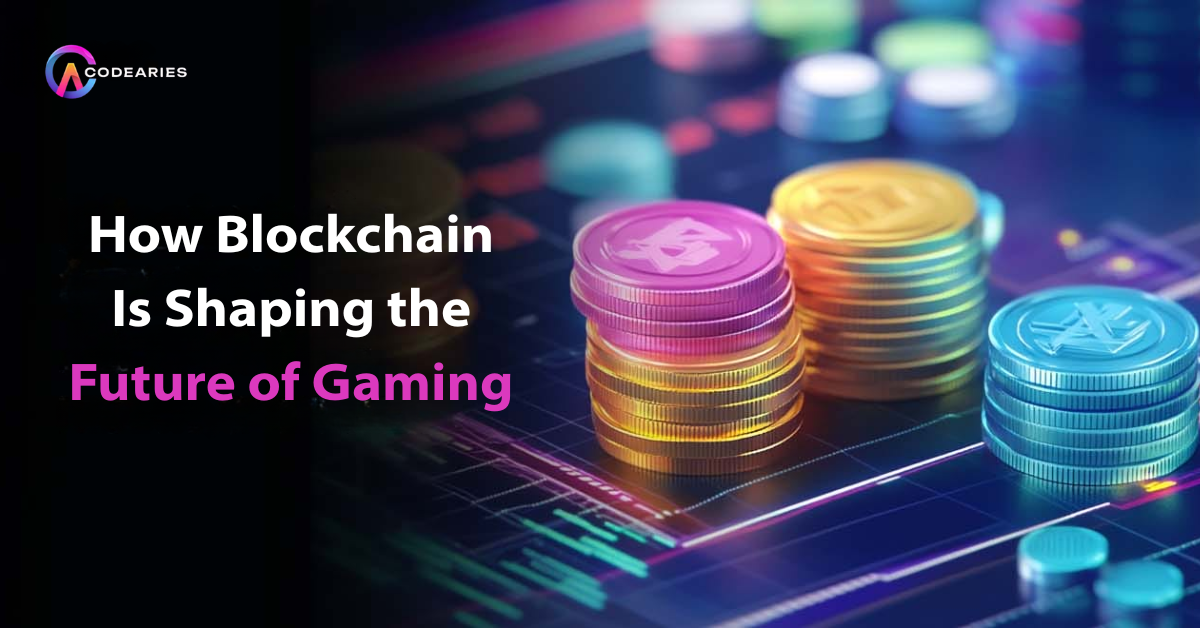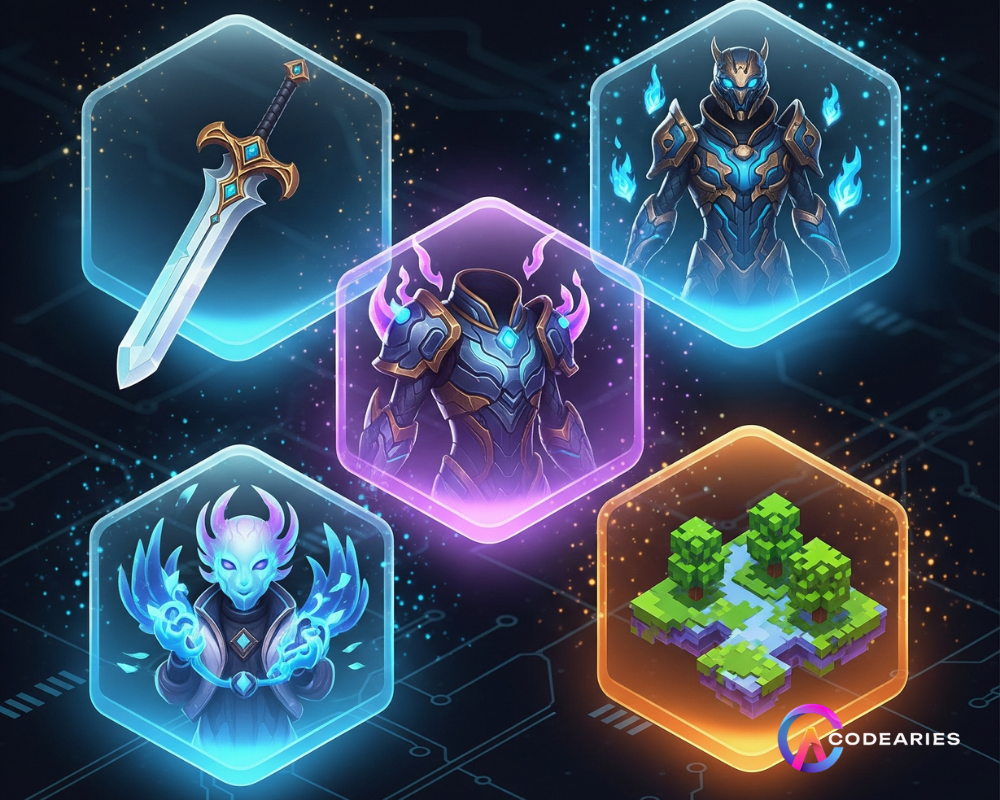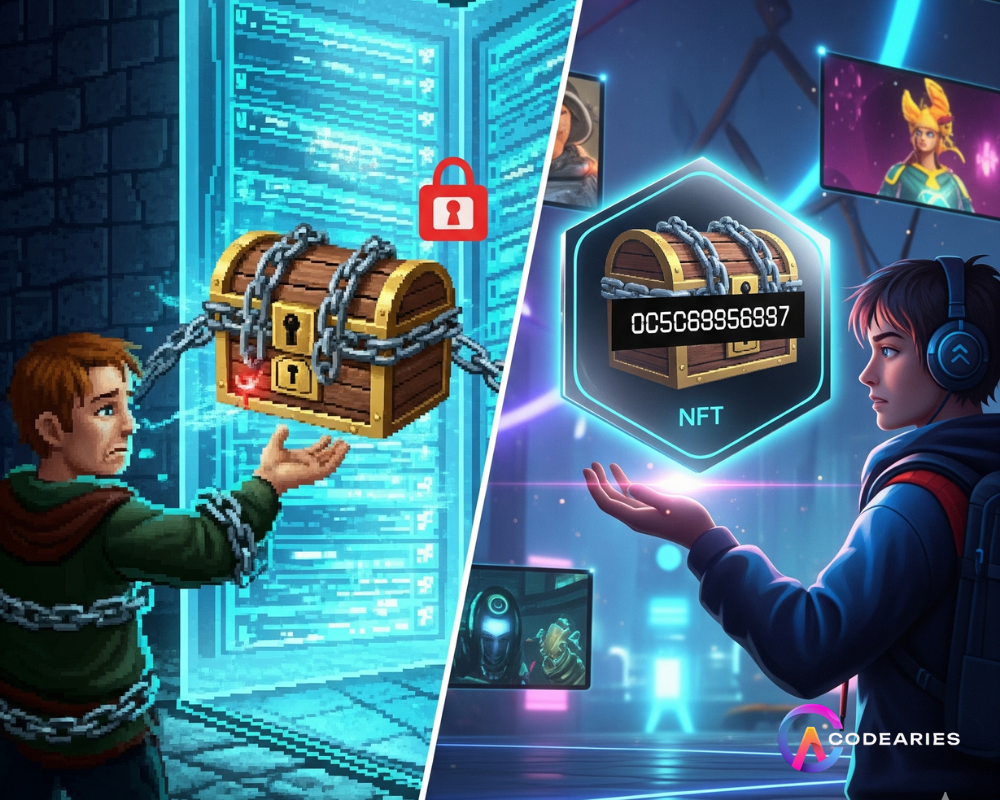
The gaming industry is leading the way in technology, evolving quickly and changing how we play, own, and interact in virtual worlds. One major technology driving this change is blockchain, a decentralized digital ledger that aims to transform game design, ownership, economies, and player engagement.
As we look toward 2025 and beyond, blockchain’s effects on gaming are significant and varied. It opens up new possibilities for player empowerment, creativity, and economic opportunity. This blog will examine how blockchain is influencing the future of gaming, explain its main applications, and show how Codearies helps gaming companies use this groundbreaking technology to create next-gen experiences.
The Gamer’s Paradigm Shift: From Play-to-Own and Beyond
In traditional gaming models, players spend time and money but often do not own the digital items they earn. Virtual items are locked within games and controlled by centralized servers, often disappearing or losing value if a game closes. Blockchain changes this situation by enabling:
- True Ownership: Digital assets, such as in-game items, skins, characters, or collectibles, become verifiable, transferable tokens on the blockchain, owned by players instead of publishers.
- Interoperability: Assets from one game can be used or traded in others, creating interconnected metaverses.
- Economic Empowerment: Players can make money from their skills and creations by selling NFTs or taking part in decentralized gaming economies.
This change moves gaming from mere consumption to active participation, blurring the lines between players, creators, and entrepreneurs.
Key Areas Blockchain Is Disrupting Gaming
1. NFTs: Digital Scarcity and Provenance
Non-Fungible Tokens (NFTs) are unique digital items secured on a blockchain. In gaming, NFTs prove the rarity and ownership of in-game assets, enabling:
- Item trading on open marketplaces (e.g., OpenSea, Magic Eden)
- Cross-game functionality where a sword or skin becomes usable in multiple titles
- Provable authenticity combating counterfeit or duplicated assets
NFT-based games like Axie Infinity have shown how ownership and trading can create lively player-driven economies..

2. Play-to-Earn (P2E) Models
Play-to-earn changes time spent gaming into real economic value. Players earn valuable cryptocurrencies or NFTs by:
- Competing in tournaments
- Completing quests or achievements
- Contributing to game development or governance
This model creates incentives for engagement and sustains player communities economically.
3. Decentralized Gaming Platforms and DAOs
Blockchain allows decentralized autonomous organizations (DAOs) to govern games collectively. Players vote on updates, rules, and economic decisions. This shifts power from centralized publishers to active communities, encouraging co-creation and trust.
In some cases, entire gaming platforms operate on the blockchain, hosting thousands of games with interconnected economies and shared ownership rules.
4. Smart Contracts Automating Gameplay and Economies
Smart contracts enable game actions, such as asset transfers, loot drops, and staking rewards, to happen automatically and transparently, without needing human input. This guarantees:
- Fair and tamper-proof gameplay
- Instant, trustless transactions of assets and rewards
- Complex economic rules embedded in the protocol
These self-executing contracts power decentralized item marketplaces and financial systems in games.
5. Metaverse Integration and Virtual Economies
Virtual worlds like Decentraland and The Sandbox use blockchain for land ownership, governance, and digital commerce. This creates lasting metaverses where users can socialize, shop, play, and build.
Blockchain rewards creators and participants in these worlds with tokenized economies, opening new revenue streams and interactive experiences.
Benefits for Players and Developers
| Players | Developers/Companies |
| True ownership and control | New business models and revenue streams |
| Ability to monetize skills/assets | Access to global player economies |
| Cross-platform experiences | Transparent, automated asset management |
| Enhanced engagement and loyalty | Reduced cheating and fraud risk |
| Dynamic, evolving game worlds | Community-driven governance and innovation |

Overcoming Challenges
Despite its promise, blockchain gaming faces hurdles:
- User Experience: Managing wallets and crypto assets can be difficult for gamers who are not familiar with blockchain.
- Scalability: Blockchain networks need to handle millions of interactions quickly and cheaply.
- Regulation: NFT and crypto earnings raise questions about taxes and compliance.
- Sustainability: Energy usage concerns lead to a push toward greener chains.
- Market Volatility: Changing crypto values affect player earnings and the health of the ecosystem..
How Codearies Empowers Gaming Innovators
At Codearies, we support the future of gaming by providing tailored blockchain solutions that combine innovation, user-friendliness, and compliance. Whether you are starting an NFT collectible game, developing a DeFi-driven metaverse, or integrating play-to-earn economics, we offer complete support.
Our Capabilities:
- Custom Blockchain Development:
We create scalable, secure, and interoperable protocols on Ethereum, Solana, Polygon, Avalanche, and others. - NFT Marketplace and Tokenization:
We help mint, manage, and trade unique digital assets with royalty systems and smooth user experiences. - Decentralized Governance Implementation:
We empower player communities through DAO structures and clear voting systems. - Game Backend Integration:
We connect blockchain logic seamlessly with game engines, mobile apps, and web platforms. - Smart Contract Engineering and Audits:
We ensure secure, bug-free contract deployment with predictive economic models. - UX/UI Excellence for Players:
We provide user-friendly wallet management, matchmaking, and marketplace experiences that simplify blockchain interactions. - Compliance and Security:
We assess regulatory needs and implement KYC/AML when required, while protecting player data with high-level security measures.
FAQs
Can Codearies help build blockchain-based games from scratch?
Absolutely. We design, develop, and launch fully customized blockchain gaming platforms that fit your vision and audience.
What blockchains do you work with for gaming projects?
We primarily use Ethereum, Solana, Polygon, Avalanche, Binance Smart Chain, and private chains, choosing based on scalability, costs, and ecosystems.
How do you handle wallet integration and user onboarding?
We focus on smooth, secure onboarding with layers that protect users from crypto complexity, including social logins and custodial wallet options.
How does Codearies support NFT implementations?
We develop minting platforms, marketplaces, royalty systems, staking, and yield farming solutions that are fully customizable for your game’s economy.
Are Codearies solutions compliant with global regulations?
Yes, compliance is essential. We tailor our systems and processes to meet GDPR, KYC/AML, and industry-specific requirements across different regions.


